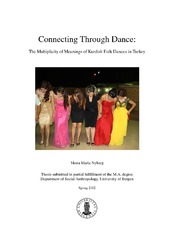| dc.description.abstract | The thesis is unraveling a wealth of meaning in a widespread phenomenon amongst Kurds in Turkey; folk dances. I use Andriy Nahachewsky's categories participatory' and presentational' dances to distinguish folk dances as social activities in the field' from folk dances with the aim that are rehearsed and choreographed to be performed to an audience. I analyze Kurdish dances in participatory' contexts like weddings celebrations, concerts and political demonstrations, and I discuss the practices of teaching presentational' Kurdish folk dances in culture centers. By analyzing Kurdish dances in ceremonial contexts, like wedding ceremonies and henna nights, I examine how the dances are both ritualized forms of expressing social statuses, and part of their sociality as they are connected to a relationality that Suad Joseph defines as connective patriarchy'. I go on to discuss how the dances have been used in the creation of a national Turkish identity, and how actors of the Kurdish movement are now using the dances as symbols of Kurdish national unity, and how they use promotion of Kurdish cultural in order to legitimize Kurdish political representation. I then move on to how teachers in pro-Kurdish culture centers promote Kurdish culture through emphasis on either empersonment' or professionalization of the dancers and fixation of the dances. In the last chapter I examine how the dances are being used as political protest in political demonstrations. Because of the ambiguous quality of the dance, both since it encapsulate a multiplicity of meanings - both political and non-political - and because of the way that these meanings often are expressed and understood implicitly, the dances are powerful political symbols and icons. I argue that the dances can be both representations and a part of people's habitus, because its ideological processes have a complex relation to and grounding in experiential aspects of social life. | en_US |
